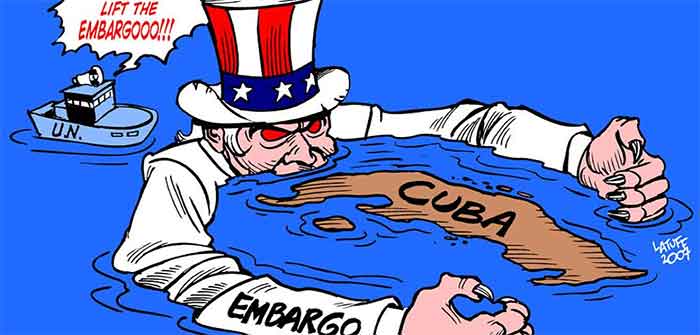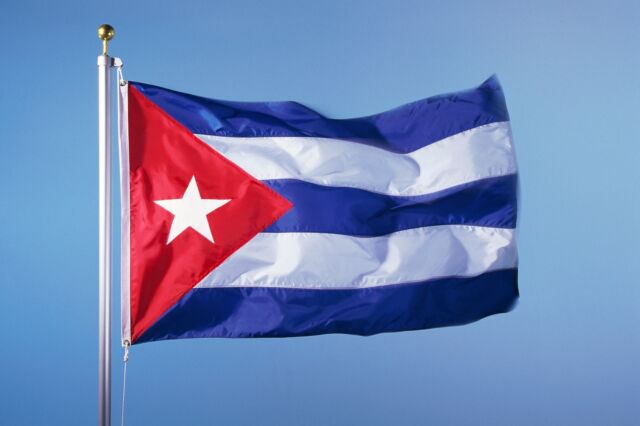
The United Nations General Assembly (UNGA) has overwhelmingly voted in favor of a resolution condemning the U.S. embargo on Cuba for the 30th year in a row. Only the U.S. and Israel voted against the measure on Thursday, while Ukraine and Brazil abstained.
Cuba celebrated a new victory in its struggle against the U.S. blockade, by achieving overwhelming support in the UNGA for a resolution approved by 185 votes in favor, two against and two abstentions.
Since 2019, the US has “escalated the siege around our country, taking it to an even crueler and more human dimensions, with the purpose of deliberately inflicting the biggest possible damage on Cuban families,” Cuban Foreign Minister Bruno Rodriguez told the assembled representatives.
The diplomat slammed US President Joe Biden for continuing the “maximum pressure” policy of his predecessor Donald Trump rather than resuming the trend toward warming relations Barack Obama set in motion during his last year in office.
While acknowledging the Biden administration had made some extremely limited moves to open up flights, remittances, and consular services with Cuba, Rodriguez argued that “the blockade, which has been tightened to the extreme, continues to be the central element that defines the U.S.-Cuba policy.”
Since Biden has been in office, the embargo has cost the Cuban economy an estimated $6.35 billion, Rodriguez said – a figure that translates to more than $15 million per day. While he stressed he did not blame the US for all of Cuba’s problems, denying its influence as “the main cause of the deprivations, scarcities and hardships suffered by Cuban families would be failing to tell the truth,” he explained.
The U.S. abstained from a vote condemning the embargo for the first time in 2016, shortly after Obama restored official relations with the island. However, Trump resumed previous presidents’ efforts to isolate the socialist nation. Washington imposed the embargo in 1960 after Fidel Castro’s revolution overthrew the US-friendly Batista government and nationalized properties belonging to American citizens.
Both the Trump and Biden administrations have held up “human rights” to justify decades of economic strangulation, an argument Cuba’s deputy UN ambassador, Yuri Gala, dismissed as illogical.
“If the United States government really did care for the well-being, human rights and self-determination of the Cuban people, it could lift the embargo,” he said, adding that Washington could lift the economic restrictions currently choking off economic opportunities for would-be capitalists.
Instead, Rodriguez argued, the US was weaponizing Big Tech and media “in a virulent disinformation and disparagement campaign against Cuba, using our children, youths and artists as the targets of this political and media bombardment.”
Washington imposed further sanctions on Cuba last year, condemning the police response to an outbreak of protests that began with outcry over food and drug shortages and morphed – with the U.S.’ help, according to Havana – into violent anti-government demonstrations.
Cuba’s Losses Due To Blockade
A Granma report said:
The report presented for the thirtieth time states that only between August 2021 and February 2022 that unilateral policy caused Cuba losses in the order of 3,806.5 million dollars. The figure is 49% higher than that reported between January and July 2021 and a record in just seven months.
At current prices, the accumulated damages during six decades of the blockade amount to 150,410.8 million dollars, with a great weight on sectors such as health and education, in addition to the damage to the national economy and the quality of life of Cuban families.
In the first 14 months of the Biden Administration alone, the losses caused by the blockade amounted to 6,364 million dollars, which is equivalent to an impact of more than 454 million dollars a month and more than 15 million dollars a day, according to the document.
The extraterritorial impact of the blockade harms the sovereignty of the countries of the United Nations, sanctions their businessmen and impedes access to their ports for third party ships that dock in Cuba. It also prevents the importation into Cuba of articles produced in any country when they have 10% or more of U.S. components, the foreign minister denounced.















































